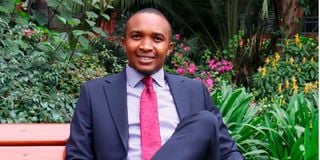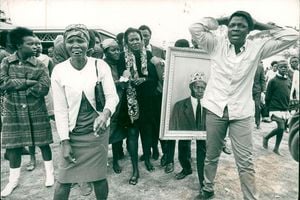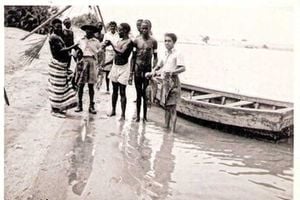
Lawyer David Morara Kebaso during an interview in Nairobi on August 21, 2024.
Named after his grandfather the late firebrand politician George Morara, lawyer David Morara Kebaso has become an instant social media sensation in the past few months.
The Nairobi-based businessman-turned-activist has in the past months rattled State agents through his campaign of questioning stalled national government projects and demanding accountability for wasted public funds.
Vocal and eloquent Mr Morara, 28, has been on a sojourn, using satire, including imitating President Ruto’s popular speeches about allocations for projects, to shine a spotlight on white elephants strewn countrywide.
But unknown to many, the younger Morara is a grandson to the firebrand post-independence politician, the late George Morara, who was among leaders who demanded answers from the State about the assassination of populist minister Tom Mboya.
Although younger Kenyans born after might not know much about the firebrand Member of Parliament then representing modern day West Mugirango, those who knew him and have seen exploits of the younger Morara suggest an apple does not fall far from the tree.
"My intention is to sensitise Kenyans about corruption in government. That is why l have been going round the country to reveal stalled projects and those that have not kicked off despite promises by President Ruto's administration," Mr Morara said.
"When Gen Zs called for protests l had no option other than to join them in the fight for a better Kenya," added the father of two (a girl and a boy).
He regrets that though many young people were killed during the Gen Zs protests, the youth did not fully achieve what they wanted- good governance and a change of systems to tame corruption in government.
"Nobody should lack clean drinking water, nobody should lack a good education and access to healthcare, but many Kenyans cannot access the basics because of poor leadership and corruption and that is what we were and are still fighting for," he said.
He added: "I feel so bad when l see wastage of public resources and stealing of taxpayers money."
About whether he fears for his life he responded:
"The fight for better governance is beyond my life. All of us will die at some point. So l don't fear death. I have received numerous threats from people l believe are State mercenaries. But l will not be cowed by threats,” he added.
He also revealed that Kenyans of good will have been funding his project tours across the country.
As a parting shot, the first born in a family of three said:
"There is a lot of hope for a better Kenya. For now, l am not interested in politics or any political seat. I just want a better Kenya."
Morara, the firebrand politician, died mysteriously in a road accident hours after demanding answers from then President Jomo Kenyatta’s administration about the whereabouts of the killer of Mboya.
As he sipped a drink one evening at an entertainment joint in Lusaka, Zambia, early September 1970, the West Mugirango MP, said he bumped into Nahashon Isaac Njenga Njoroge- the man convicted and sentenced to death for the killing of Mboya on July 5,1969.
An astonished Morara, who was among members of the Social Welfare and Employment parliamentary committee there on official duty, later told the House that he confronted Njenga ,who in panic, bolted out of the club.
The government had announced the previous year that Njenga had been hanged for the assassination of the powerful cabinet minister along Nairobi's Government Road (present day Moi Avenue).
Upon arrival at Nairobi's Embakasi Airport, Morara and some members of the House team chaired by the then Kandara MP George Mwicigi, headed to Parliament Buildings for a press conference.
Morara narrated the encounter with Njenga in Lusaka and gave the Government a 48-hour ultimatum to produce him.
Some 48 hours later, the MP was dead - killed in a road accident along the Kakamega -Kisumu highway.
Morara died while travelling to Nairobi from Kakamega.
Morara, who had served as an MP for barely nine months, was only 34 years old. More than 50 years later the fiery politician's death still remains a mystery.
While friends and family maintain that he was assassinated by State agents as part of a wider cover-up scheme of the assassination of Mboya, others believe it was an unfortunate accident.
The politician's wife died in India in October 2010 over heart related complications. Some of his children live abroad where they went after their father's death.









